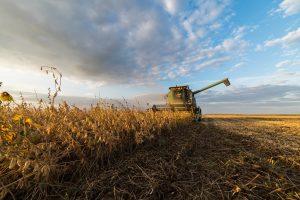SIU Medicine webinar aims to help farmers cope with stress
By Ken Keenan For Chronicle Media — October 28, 2023
With fall harvest season underway, SIU Medicine stated that farmers may feel overworked and overlooked, and that their mental health can be affected by stress from debt, production costs, equipment and employee management, personal relations and more.
As part of an ongoing effort to address mental health concerns in the area’s farming community, Southern Illinois University’s Center for Rural Health and Social Service Department will host “Fielding Resistance: Identifying and Supporting Struggling Farmers,” a Farm Family Resource Initiative webinar, at noon Thursday, Nov. 2.
The one-hour, free webinar — supported by the Illinois Department of Human Services, the Division of Mental Health and the Illinois Department of Agriculture, in cooperation with USDA National Institute of Food and Agriculture — is intended to help community members recognize the potential pitfalls affecting rural health care in farming regions, and to help providers and the public better support the agriculture workforce.
During the webinar, licensed professional educator and board-certified counselor Dr. Nick Weshinskey and SIU Medicine Ag Resource Specialist Karen Stallman will discuss the challenges facing farmers and their family members, and identifying signs of depression, anxiety and suicidality. Weshinskey and Stallman will also outline resources that are available to farmers, their families and those who work beside them.
“We’ve done webinars before to encourage people to get help,” Stallman said. “But we’re doing it a bit different this time with Dr. Weshinskey. We’re also trying to make it convenient … trying to see if noon is a time when more people are available.”
With fall harvest season underway, SIU Medicine stated that farmers may feel overworked and overlooked, and that their mental health can be affected by stress from debt, production costs, equipment and employee management, personal relations and more. When farmers are struggling, they may internalize their problems and not reach out for assistance.
“Lots of times, we get questions from people, such as, ‘How would I know if someone needs help?’” Stallman said. “So, these webinars help those people to notice how somebody is struggling, and learn what kind of resources we have to help.”
Stallman continued: “I grew up on a farm, and there is a lot of stress. What I call it is that chronic drip-drip-drip from things you can’t control. The weather is a big factor, commodity prices, policy changes — all stressors. And also, succession of the farm. Who will take over the farm when the farmer retires, when children don’t want to? It’s a number of things that can certainly stack up.”
A common perception is that farmers are a tough breed, able to handle just about anything that comes their way as part of dealing with the long hours and difficult nature of their work. Stallman said farmers, including herself, tend to think that way as well.
“Historically, we feel we can deal with problems … think we can fix things,” she said. “Farmers are good at taking care of their equipment, livestock and crops, but not always good at taking care of themselves. So, mental health is no different than a broken arm when you get a cast. The farmer is the most important asset on the farm, so it’s particularly important to keep that farmer healthy.”
Stallman said it’s also important for farmers to feel they’re being recognized, as their work is vital in providing food across the nation.
“For the hard work they do, farmers should be appreciated,” Stallman said. “Sometimes we forget where our food is coming from, but there’s a farmer out there making it happen. So, it is important to appreciate what they’re doing for all of us.”
Registration information for the webinar is available at www.highmarksce.com/siumed. In addition, Stallman said a no-cost, anonymous help line is available 24/7 at 1-833-FARM-SOS (833-327-6767) for anyone seeking assistance or resources.
“Anyone associated with the agriculture industry can call, not just farmers,” Stallman said. “We can reach out before we get to a crisis situation, how to deal with those stressful moments. Small farms, big farms, hired hands — you’re not alone in this. We’re just trying to be a good neighbor and provide help.”
For more information about FFRI, visit www.siumed.org/farm.







